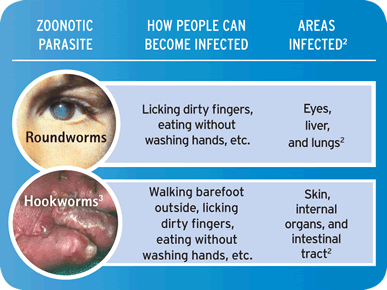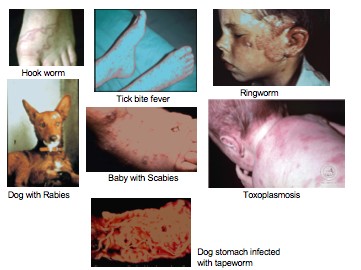Zoonosis is a fancy word for the diseases and parasites that people can get from animals. Overall contact with our animal companions has fewer risks than our daily interaction with people. Most of the infections we can get from our pets can be prevented by simple hygiene, and proper preventative pet health care.
Rule #1: Always wash your hands before eating (just like your mom told you!)
There are a number of parasites that spread through accidental exposure to the stool of pets and wild animals. Since the eggs of these parasites are microscopic, only a tiny amount of feces need to get mixed into the soil or picked up from touching the pet in order for the parasite to spread. One highly publicized parasite that spreads this way is
toxoplasmosis. “Toxo” is a parasite that has very little effect on healthy adults, but is a risk for immune compromised people and babies in the womb. You may have heard of this one because doctors advise pregnant women not to clean kitty litter pans. (Toxoplasmosis infections are more often gotten from eating underdone meat.)
So what does protect you? Soap and water–simple, cheap and effective! (and don’t eat rare meat if you are pregnant or immune compromised.)
Rule #2: Control parasites.
As we discussed above parasites like roundworm, toxoplasmosis, and hookworm are spread through the stool of an animal that has parasites. Pets with parasites do not always have diarrhea—so don’t count on your pet being parasite free because they have normal stool. Instead make sure you are using an appropriate parasite control regime.
In addition to parasites in poop, there are the creepy crawly ones—the fleas and ticks. These annoying parasites can give diseases to both you and your pets. Now days there are easy medications to control all of these pesky parasites and your Veterinarian is the best source of information for the products best suited to your needs.
Rule #3: Keep your pets properly vaccinated.
Rabies– Most cases in New York are in wild animals but every year there are a few cases reported in cats, dogs, and livestock. While human cases are rare, they are fatal unless immediate preventative steps are taken. For this reason health departments take animal bite wounds VERY seriously. If a pet is not vaccinated the health department may insist on quarantine or euthanasia for rabies testing even if the pet appears healthy.
So what should you do? Always, ALWAYS, keep your pet current on vaccination. It’s effective, it’s simple, and it’s important.
Rule #4: Ask your Veterinarian
Veterinarians are trained to recognize infections that can affect people as well as animals, how to prevent and how to treat them. Let us know if you have any special concerns or if anyone in your family is more susceptible to infections.















Social